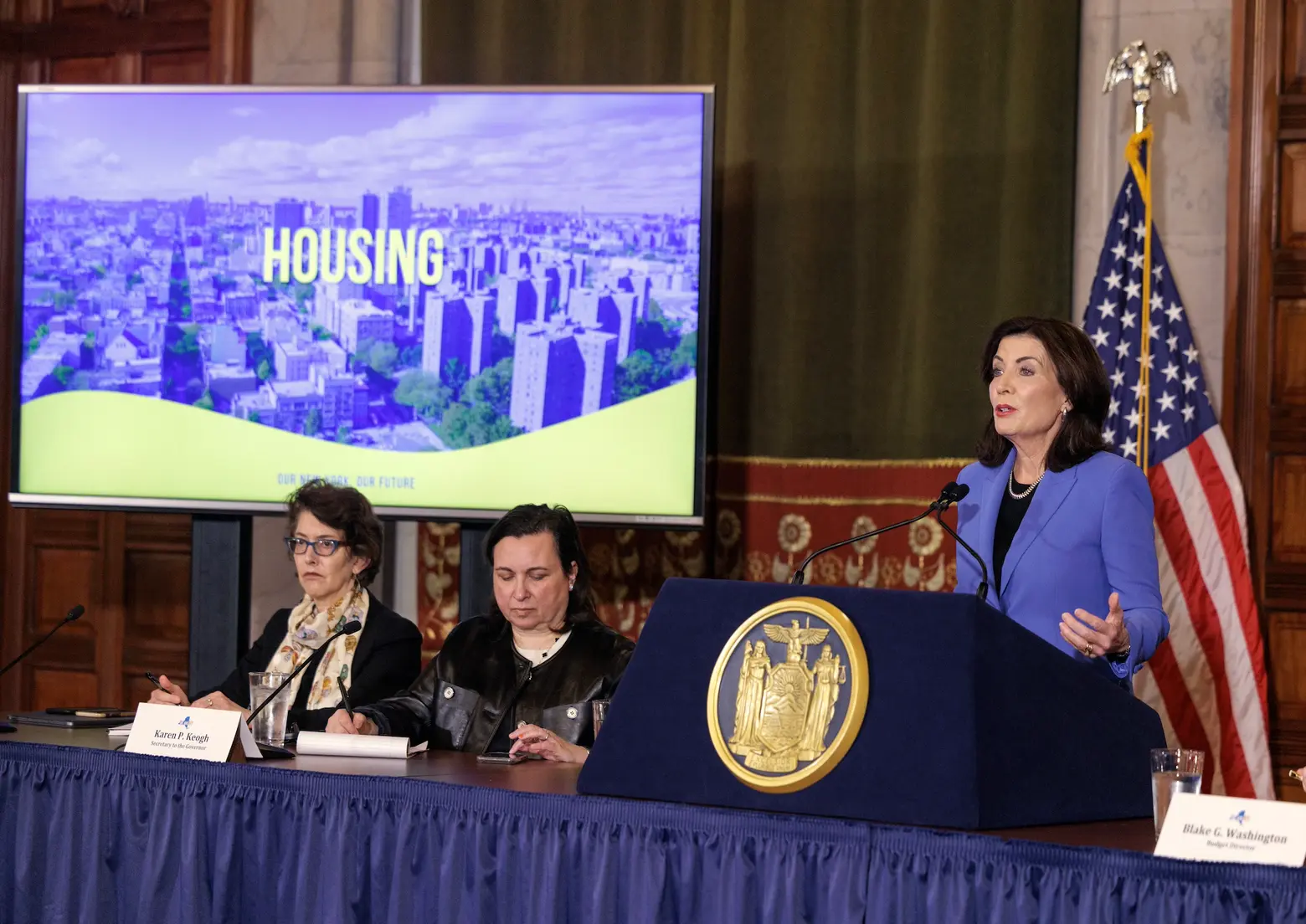New York lawmakers finally pass housing package

Photo by Mike Groll/ Office of Governor Kathy Hochul on Flickr
After over two years of inaction, state lawmakers have agreed on a legislative package to address New York’s housing crisis. Approved over the weekend, the $237 billion state budget includes several new policies aimed at addressing the statewide housing shortage, including a new tax incentive for developers and the lift of the floor-to-area ratio (FAR) cap. The deal also contains tenant protections, including a version of the “good cause” eviction proposal.
“I promised New Yorkers that we’d tackle the housing affordability – and in this budget, we got it done,” Hochul said. “As the first governor in half a century to put housing front and center, I will keep fighting to make our state more affordable and more livable and help every family achieve their New York dream.”
The new tax break, called 485-x, is a 10-year program that succeeds 421-a, which expired in 2022 and gave developers a tax exemption in exchange for including some affordable housing at residential buildings. The new program provides a 40-year exemption, up from 35 years.
According to The Real Deal, the new program removes the highest-income option of 421-a, which let developers satisfy the affordable housing requirement by setting aside 30 percent of units for households earning 130 percent of the area median income (AMI).
The budget includes an extension for the construction deadline for developments under the lapsed 421-a program until 2031, ensuring that thousands of at-risk rental units, including affordable housing, can still be built.
The budget also established a new tax incentive for office conversion projects with affordable housing and the removal of the FAR cap in New York City for the first time since the 1960s. Advocated for by Mayor Eric Adams, the cap’s removal would allow the city to build residential buildings up to 15 and 18 times their lot size, while also requiring affordable housing.
Additionally, the budget includes a new pilot program to clear a way toward legalizing basement and cellar apartments. According to the budget bill, the program is only applicable in certain community districts, with 15 of 59 community districts listed in the bill. Community boards will have a chance to weigh in on joining the pilot program.
A version of good cause eviction, which gives tenants the right to challenge a rent hike if it exceeds a certain amount, was included in the final budget, but it was narrowed from its original proposal. Under the legislation, rent increases will be limited to no more than 10 percent, or 5 percent plus inflation. If the rent hike is above that threshold, it can be considered “unreasonable” and fought in court.
The protections apply to New York City tenants; other municipalities must opt-in to the program. The bill exempts buildings built in 2009 or later for 30 years, spares owner-occupied buildings with eight or fewer units, and exempts landlords who own 10 or fewer units across their portfolios, according to City & State.
The budget deal also alters the 2019 tenant protection law by increasing the amount landlords of rent-stabilized apartments can increase rent after conducting individual apartment renovations. Landlords can recoup up to $30,000 for repair work, up from $15,000. If an apartment is vacated by tenants of 25 years or more, the cap will increase to $50,000.
Other protections include barriers against “deed theft,” creating a clear definition of the crime in the larceny statute and limiting the ability of predatory investors to harass homeowners into selling their family homes.
The New York City Chapter of the Democratic Socialists of America (NYC-DSA), the largest socialist organization in the United States, denounced the governor’s budget.
“This budget is a damning reflection of the stranglehold that the real estate industry has over New York politics. For the past five years, we have been fighting for ‘Good Cause Eviction’ alongside millions of working-class New Yorkers, a bill that provides a defense against rent increases and informal evictions through non-renewal of leases,” NYC-DSA said in a statement.
“Governor Hochul’s version is ‘Good Cause Eviction’ in name only — with major carve-outs to make it more palatable to the Real Estate Board of New York (REBNY) and greedy landlords, leaving at least three million tenants unprotected.”
The governor has also secured $500 million in capital funding to construct up to 15,000 units of housing on state-owned sites. Proposed sites for development include the Creedmoor Psychiatric Center campus in Queens, which would be transformed into a mixed-use community with over 2,800 homes, green space, bike infrastructure, and more.
The budget includes measures that will bolster the state’s Pro-Housing Communities program by allowing the state to make Pro-Housing Communities certification a requirement for localities to receive up to $650 million in state discretionary funding.
Rachel Fee, executive director of the NY Housing Conference, commended the budget deal.
“We applaud Governor Hochul and the NY State Legislature for reaching an agreement on a wide range of policy solutions to address NY’s housing shortage. Tax incentives, zoning changes and new funding will help build more housing and most importantly, it will make NY a more affordable place to live for renters and homeowners.”
Fee continued: “It won’t happen overnight, but this agreement will help boost housing supply across the state by increasing affordable housing development with tax incentives; encouraging Accessory Dwelling Units; facilitating conversions of office and basements to residential housing; and by fighting insurance discrimination, which is making housing more expensive.”
RELATED:
Interested in similar content?
Leave a reply
Your email address will not be published.





























This is why we can’t have nice things. I expect many city council members will continue to skip out on property taxes and that owners will continue take units off the market. We needed to fun housing, instead we got a bailout for developers and tenants..